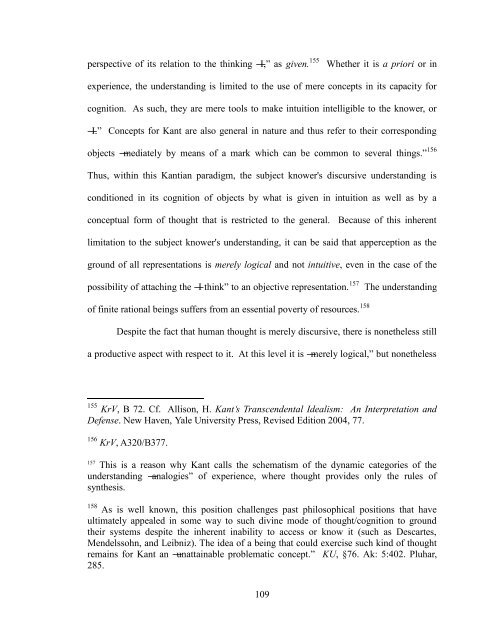The Doctrine of Self-positing and Receptivity in Kant's Late ...
The Doctrine of Self-positing and Receptivity in Kant's Late ...
The Doctrine of Self-positing and Receptivity in Kant's Late ...
You also want an ePaper? Increase the reach of your titles
YUMPU automatically turns print PDFs into web optimized ePapers that Google loves.
perspective <strong>of</strong> its relation to the th<strong>in</strong>k<strong>in</strong>g ―I,‖ as given. 155 Whether it is a priori or <strong>in</strong><br />
experience, the underst<strong>and</strong><strong>in</strong>g is limited to the use <strong>of</strong> mere concepts <strong>in</strong> its capacity for<br />
cognition. As such, they are mere tools to make <strong>in</strong>tuition <strong>in</strong>telligible to the knower, or<br />
―I.‖ Concepts for Kant are also general <strong>in</strong> nature <strong>and</strong> thus refer to their correspond<strong>in</strong>g<br />
objects ―mediately by means <strong>of</strong> a mark which can be common to several th<strong>in</strong>gs.‖ 156<br />
Thus, with<strong>in</strong> this Kantian paradigm, the subject knower's discursive underst<strong>and</strong><strong>in</strong>g is<br />
conditioned <strong>in</strong> its cognition <strong>of</strong> objects by what is given <strong>in</strong> <strong>in</strong>tuition as well as by a<br />
conceptual form <strong>of</strong> thought that is restricted to the general. Because <strong>of</strong> this <strong>in</strong>herent<br />
limitation to the subject knower's underst<strong>and</strong><strong>in</strong>g, it can be said that apperception as the<br />
ground <strong>of</strong> all representations is merely logical <strong>and</strong> not <strong>in</strong>tuitive, even <strong>in</strong> the case <strong>of</strong> the<br />
possibility <strong>of</strong> attach<strong>in</strong>g the ―I th<strong>in</strong>k‖ to an objective representation. 157 <strong>The</strong> underst<strong>and</strong><strong>in</strong>g<br />
<strong>of</strong> f<strong>in</strong>ite rational be<strong>in</strong>gs suffers from an essential poverty <strong>of</strong> resources. 158<br />
Despite the fact that human thought is merely discursive, there is nonetheless still<br />
a productive aspect with respect to it. At this level it is ―merely logical,‖ but nonetheless<br />
155 KrV, B 72. Cf. Allison, H. Kant‘s Transcendental Idealism: An Interpretation <strong>and</strong><br />
Defense. New Haven, Yale University Press, Revised Edition 2004, 77.<br />
156 KrV, A320/B377.<br />
157 This is a reason why Kant calls the schematism <strong>of</strong> the dynamic categories <strong>of</strong> the<br />
underst<strong>and</strong><strong>in</strong>g ―analogies‖ <strong>of</strong> experience, where thought provides only the rules <strong>of</strong><br />
synthesis.<br />
158 As is well known, this position challenges past philosophical positions that have<br />
ultimately appealed <strong>in</strong> some way to such div<strong>in</strong>e mode <strong>of</strong> thought/cognition to ground<br />
their systems despite the <strong>in</strong>herent <strong>in</strong>ability to access or know it (such as Descartes,<br />
Mendelssohn, <strong>and</strong> Leibniz). <strong>The</strong> idea <strong>of</strong> a be<strong>in</strong>g that could exercise such k<strong>in</strong>d <strong>of</strong> thought<br />
rema<strong>in</strong>s for Kant an ―unatta<strong>in</strong>able problematic concept.‖ KU, §76. Ak: 5:402. Pluhar,<br />
285.<br />
109


